Emotional Intelligence and Leadership Skills Assignment
VerifiedAdded on 2022/08/20
|10
|2006
|15
Homework Assignment
AI Summary
This assignment analyzes emotional intelligence in a leadership context, addressing various workplace scenarios. The student explores principles such as empathy, self-control, and effective communication, particularly in scenarios involving a store manager's behavior and diverse workforce interactions. The assignment examines the impact of emotional intelligence on team morale, performance, and decision-making, emphasizing the importance of self-awareness and adapting responses based on individual and team needs. The student provides examples of misinterpretations within a diverse environment and proposes strategies to promote cultural awareness and effective communication. Furthermore, the assignment discusses how considering the emotional impact of decisions can lead to better business outcomes, proposing a decision-making process that incorporates emotional intelligence.
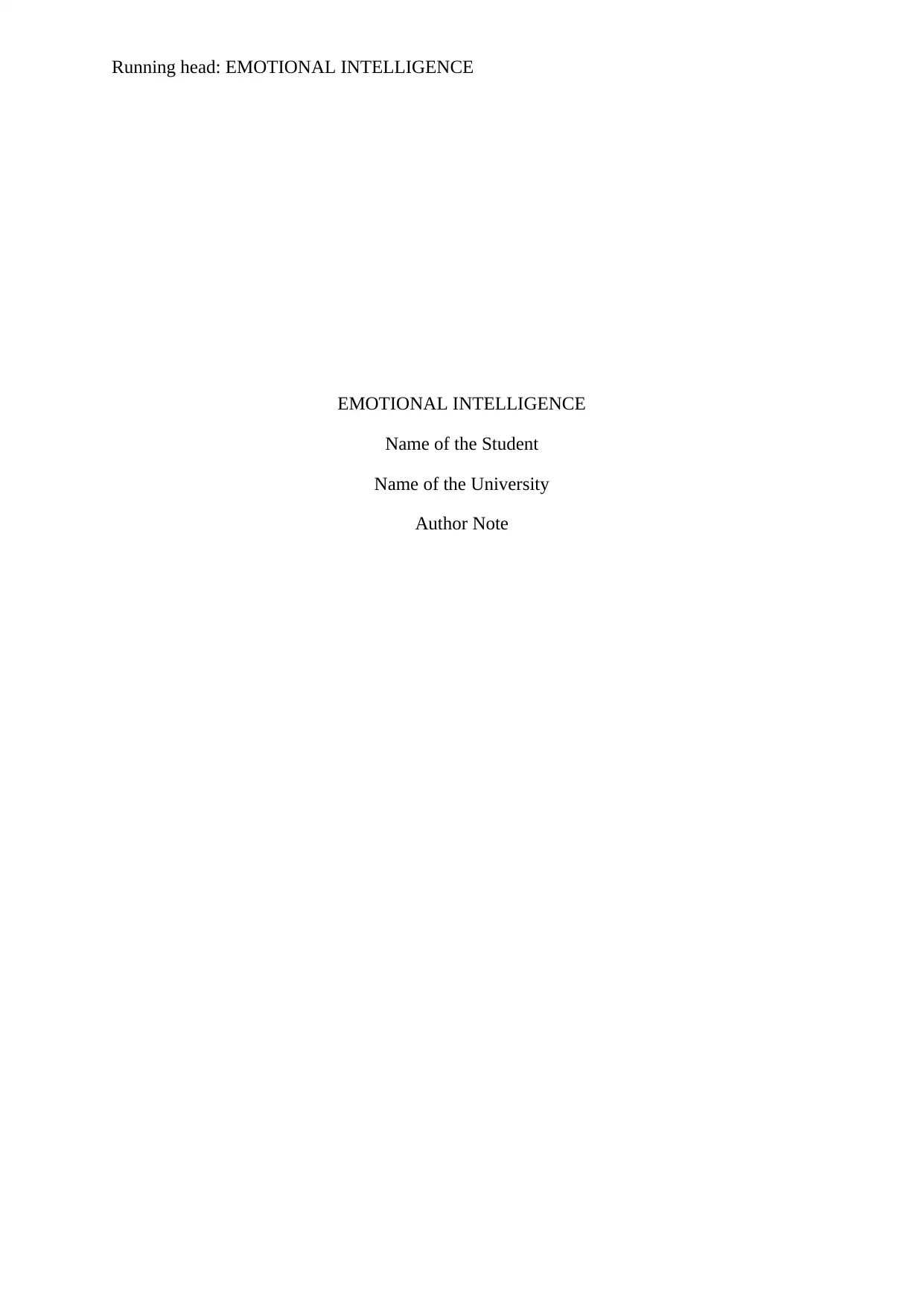
Running head: EMOTIONAL INTELLIGENCE
EMOTIONAL INTELLIGENCE
Name of the Student
Name of the University
Author Note
EMOTIONAL INTELLIGENCE
Name of the Student
Name of the University
Author Note
Paraphrase This Document
Need a fresh take? Get an instant paraphrase of this document with our AI Paraphraser
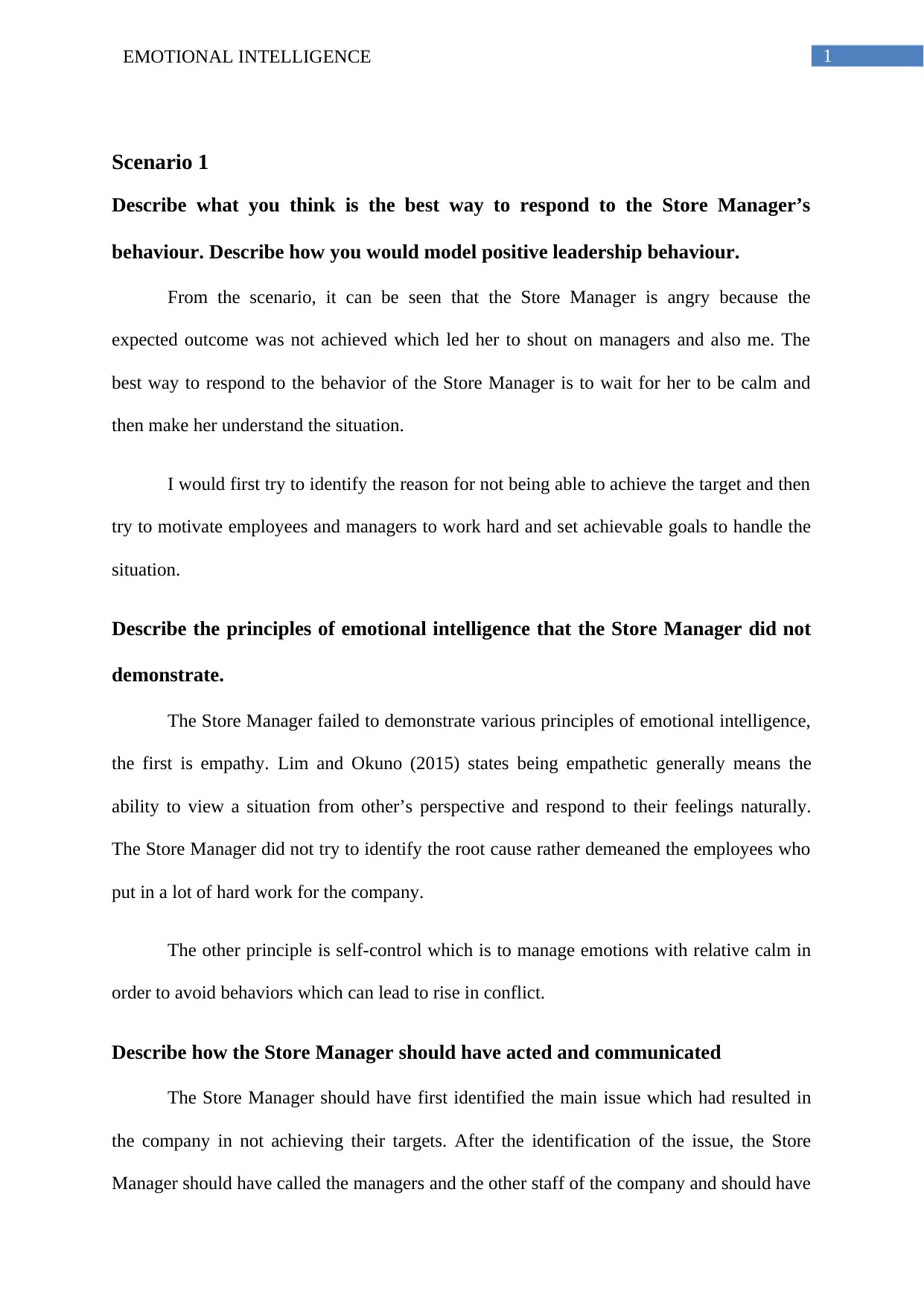
1EMOTIONAL INTELLIGENCE
Scenario 1
Describe what you think is the best way to respond to the Store Manager’s
behaviour. Describe how you would model positive leadership behaviour.
From the scenario, it can be seen that the Store Manager is angry because the
expected outcome was not achieved which led her to shout on managers and also me. The
best way to respond to the behavior of the Store Manager is to wait for her to be calm and
then make her understand the situation.
I would first try to identify the reason for not being able to achieve the target and then
try to motivate employees and managers to work hard and set achievable goals to handle the
situation.
Describe the principles of emotional intelligence that the Store Manager did not
demonstrate.
The Store Manager failed to demonstrate various principles of emotional intelligence,
the first is empathy. Lim and Okuno (2015) states being empathetic generally means the
ability to view a situation from other’s perspective and respond to their feelings naturally.
The Store Manager did not try to identify the root cause rather demeaned the employees who
put in a lot of hard work for the company.
The other principle is self-control which is to manage emotions with relative calm in
order to avoid behaviors which can lead to rise in conflict.
Describe how the Store Manager should have acted and communicated
The Store Manager should have first identified the main issue which had resulted in
the company in not achieving their targets. After the identification of the issue, the Store
Manager should have called the managers and the other staff of the company and should have
Scenario 1
Describe what you think is the best way to respond to the Store Manager’s
behaviour. Describe how you would model positive leadership behaviour.
From the scenario, it can be seen that the Store Manager is angry because the
expected outcome was not achieved which led her to shout on managers and also me. The
best way to respond to the behavior of the Store Manager is to wait for her to be calm and
then make her understand the situation.
I would first try to identify the reason for not being able to achieve the target and then
try to motivate employees and managers to work hard and set achievable goals to handle the
situation.
Describe the principles of emotional intelligence that the Store Manager did not
demonstrate.
The Store Manager failed to demonstrate various principles of emotional intelligence,
the first is empathy. Lim and Okuno (2015) states being empathetic generally means the
ability to view a situation from other’s perspective and respond to their feelings naturally.
The Store Manager did not try to identify the root cause rather demeaned the employees who
put in a lot of hard work for the company.
The other principle is self-control which is to manage emotions with relative calm in
order to avoid behaviors which can lead to rise in conflict.
Describe how the Store Manager should have acted and communicated
The Store Manager should have first identified the main issue which had resulted in
the company in not achieving their targets. After the identification of the issue, the Store
Manager should have called the managers and the other staff of the company and should have
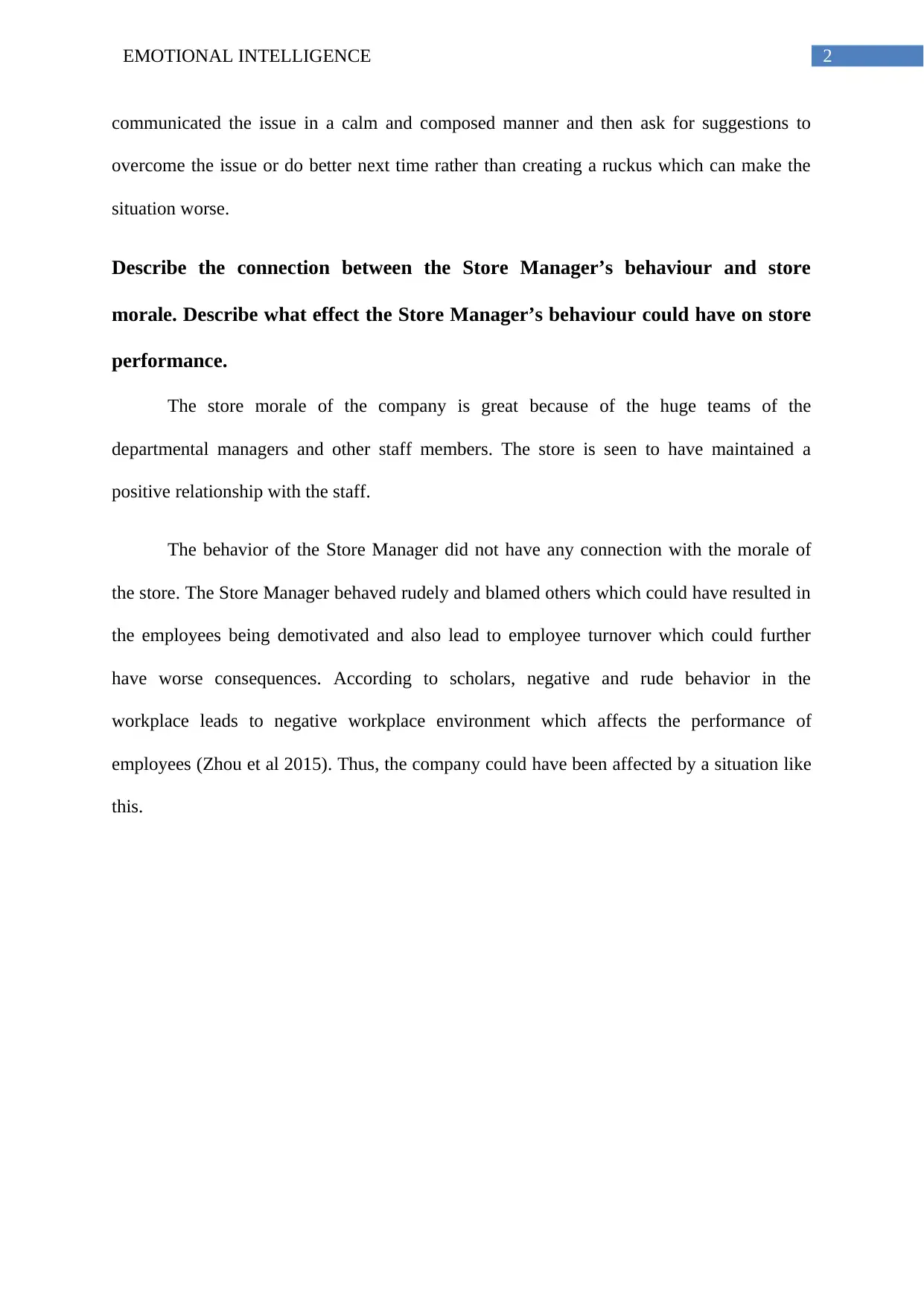
2EMOTIONAL INTELLIGENCE
communicated the issue in a calm and composed manner and then ask for suggestions to
overcome the issue or do better next time rather than creating a ruckus which can make the
situation worse.
Describe the connection between the Store Manager’s behaviour and store
morale. Describe what effect the Store Manager’s behaviour could have on store
performance.
The store morale of the company is great because of the huge teams of the
departmental managers and other staff members. The store is seen to have maintained a
positive relationship with the staff.
The behavior of the Store Manager did not have any connection with the morale of
the store. The Store Manager behaved rudely and blamed others which could have resulted in
the employees being demotivated and also lead to employee turnover which could further
have worse consequences. According to scholars, negative and rude behavior in the
workplace leads to negative workplace environment which affects the performance of
employees (Zhou et al 2015). Thus, the company could have been affected by a situation like
this.
communicated the issue in a calm and composed manner and then ask for suggestions to
overcome the issue or do better next time rather than creating a ruckus which can make the
situation worse.
Describe the connection between the Store Manager’s behaviour and store
morale. Describe what effect the Store Manager’s behaviour could have on store
performance.
The store morale of the company is great because of the huge teams of the
departmental managers and other staff members. The store is seen to have maintained a
positive relationship with the staff.
The behavior of the Store Manager did not have any connection with the morale of
the store. The Store Manager behaved rudely and blamed others which could have resulted in
the employees being demotivated and also lead to employee turnover which could further
have worse consequences. According to scholars, negative and rude behavior in the
workplace leads to negative workplace environment which affects the performance of
employees (Zhou et al 2015). Thus, the company could have been affected by a situation like
this.
⊘ This is a preview!⊘
Do you want full access?
Subscribe today to unlock all pages.

Trusted by 1+ million students worldwide
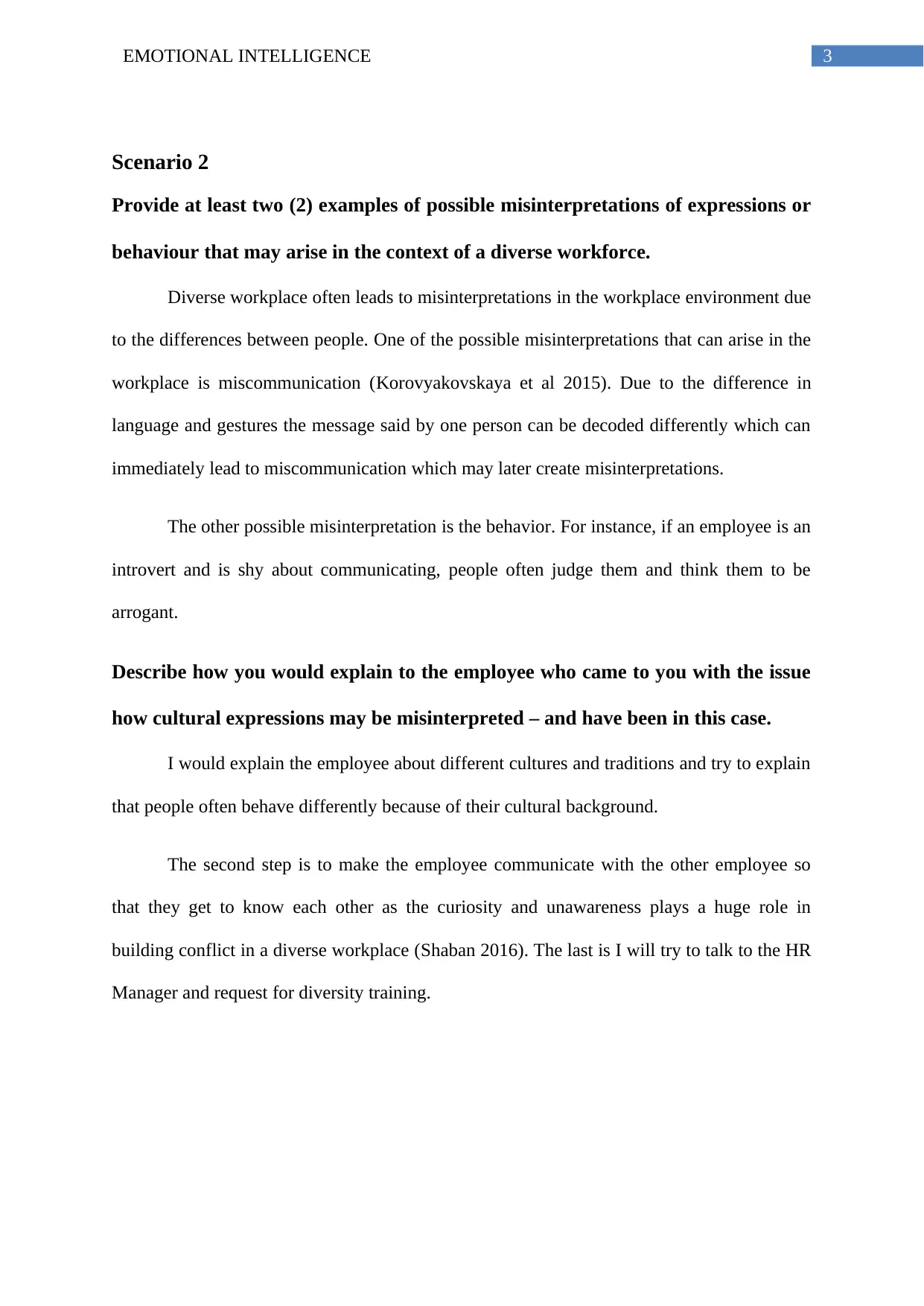
3EMOTIONAL INTELLIGENCE
Scenario 2
Provide at least two (2) examples of possible misinterpretations of expressions or
behaviour that may arise in the context of a diverse workforce.
Diverse workplace often leads to misinterpretations in the workplace environment due
to the differences between people. One of the possible misinterpretations that can arise in the
workplace is miscommunication (Korovyakovskaya et al 2015). Due to the difference in
language and gestures the message said by one person can be decoded differently which can
immediately lead to miscommunication which may later create misinterpretations.
The other possible misinterpretation is the behavior. For instance, if an employee is an
introvert and is shy about communicating, people often judge them and think them to be
arrogant.
Describe how you would explain to the employee who came to you with the issue
how cultural expressions may be misinterpreted – and have been in this case.
I would explain the employee about different cultures and traditions and try to explain
that people often behave differently because of their cultural background.
The second step is to make the employee communicate with the other employee so
that they get to know each other as the curiosity and unawareness plays a huge role in
building conflict in a diverse workplace (Shaban 2016). The last is I will try to talk to the HR
Manager and request for diversity training.
Scenario 2
Provide at least two (2) examples of possible misinterpretations of expressions or
behaviour that may arise in the context of a diverse workforce.
Diverse workplace often leads to misinterpretations in the workplace environment due
to the differences between people. One of the possible misinterpretations that can arise in the
workplace is miscommunication (Korovyakovskaya et al 2015). Due to the difference in
language and gestures the message said by one person can be decoded differently which can
immediately lead to miscommunication which may later create misinterpretations.
The other possible misinterpretation is the behavior. For instance, if an employee is an
introvert and is shy about communicating, people often judge them and think them to be
arrogant.
Describe how you would explain to the employee who came to you with the issue
how cultural expressions may be misinterpreted – and have been in this case.
I would explain the employee about different cultures and traditions and try to explain
that people often behave differently because of their cultural background.
The second step is to make the employee communicate with the other employee so
that they get to know each other as the curiosity and unawareness plays a huge role in
building conflict in a diverse workplace (Shaban 2016). The last is I will try to talk to the HR
Manager and request for diversity training.
Paraphrase This Document
Need a fresh take? Get an instant paraphrase of this document with our AI Paraphraser
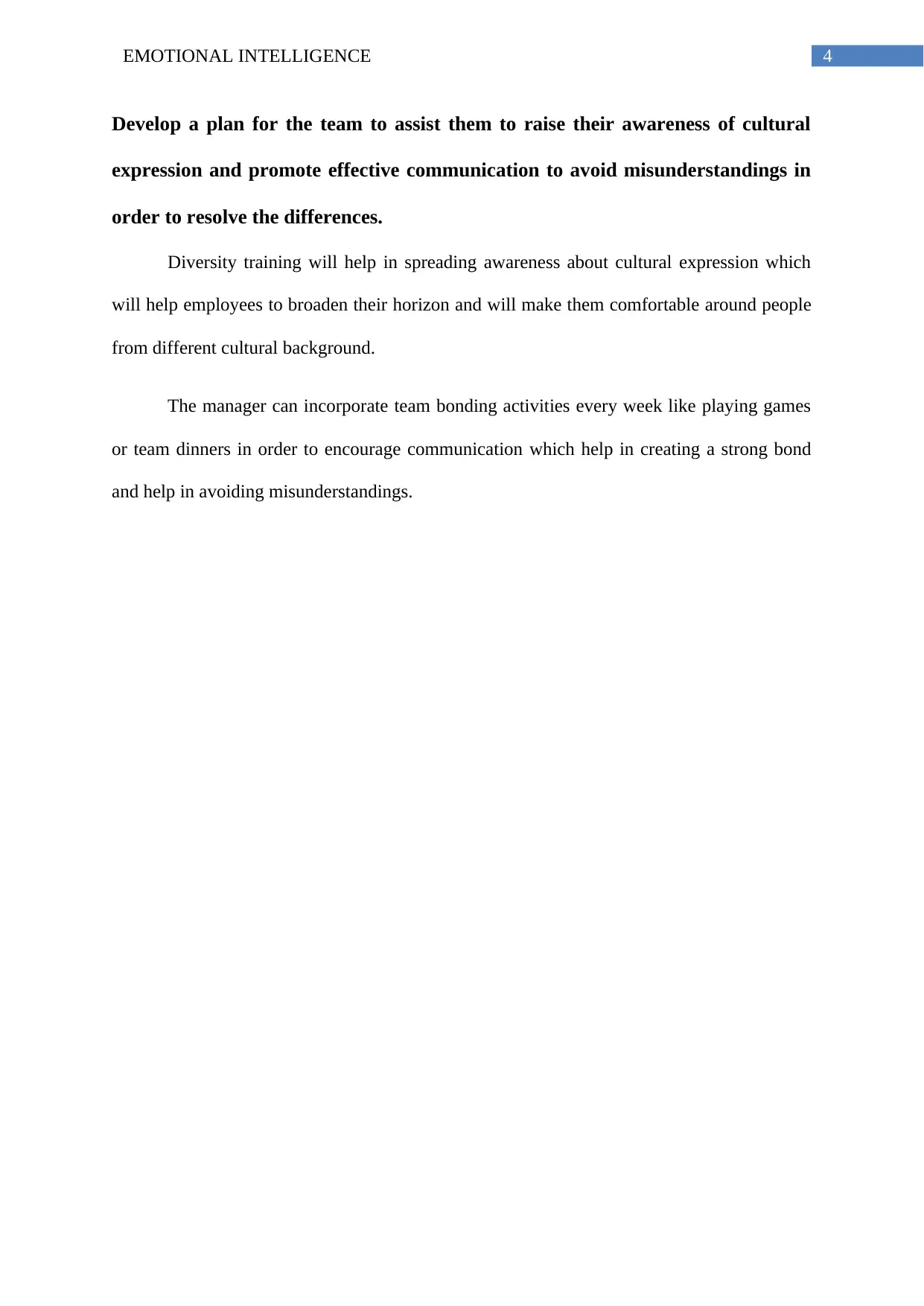
4EMOTIONAL INTELLIGENCE
Develop a plan for the team to assist them to raise their awareness of cultural
expression and promote effective communication to avoid misunderstandings in
order to resolve the differences.
Diversity training will help in spreading awareness about cultural expression which
will help employees to broaden their horizon and will make them comfortable around people
from different cultural background.
The manager can incorporate team bonding activities every week like playing games
or team dinners in order to encourage communication which help in creating a strong bond
and help in avoiding misunderstandings.
Develop a plan for the team to assist them to raise their awareness of cultural
expression and promote effective communication to avoid misunderstandings in
order to resolve the differences.
Diversity training will help in spreading awareness about cultural expression which
will help employees to broaden their horizon and will make them comfortable around people
from different cultural background.
The manager can incorporate team bonding activities every week like playing games
or team dinners in order to encourage communication which help in creating a strong bond
and help in avoiding misunderstandings.
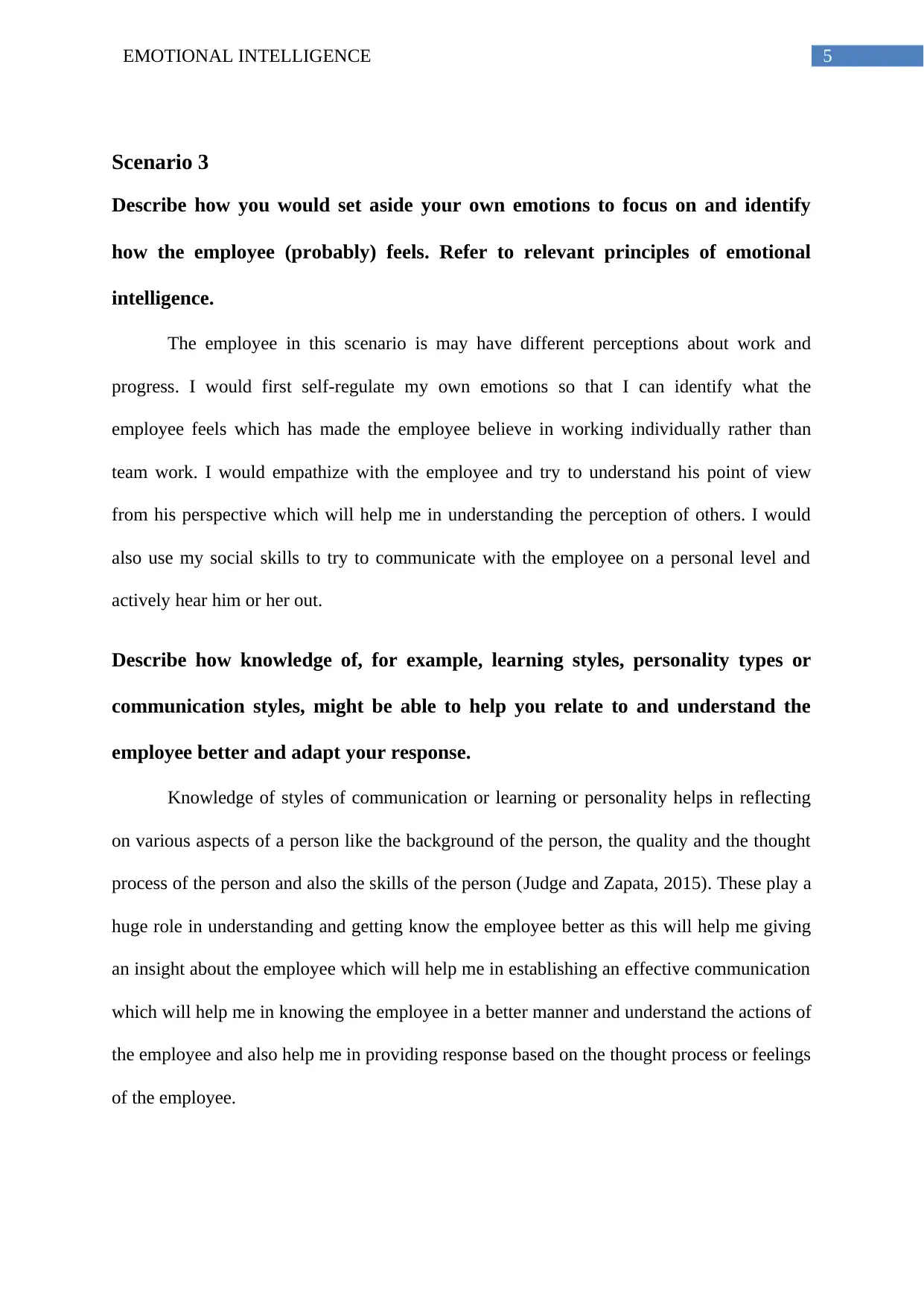
5EMOTIONAL INTELLIGENCE
Scenario 3
Describe how you would set aside your own emotions to focus on and identify
how the employee (probably) feels. Refer to relevant principles of emotional
intelligence.
The employee in this scenario is may have different perceptions about work and
progress. I would first self-regulate my own emotions so that I can identify what the
employee feels which has made the employee believe in working individually rather than
team work. I would empathize with the employee and try to understand his point of view
from his perspective which will help me in understanding the perception of others. I would
also use my social skills to try to communicate with the employee on a personal level and
actively hear him or her out.
Describe how knowledge of, for example, learning styles, personality types or
communication styles, might be able to help you relate to and understand the
employee better and adapt your response.
Knowledge of styles of communication or learning or personality helps in reflecting
on various aspects of a person like the background of the person, the quality and the thought
process of the person and also the skills of the person (Judge and Zapata, 2015). These play a
huge role in understanding and getting know the employee better as this will help me giving
an insight about the employee which will help me in establishing an effective communication
which will help me in knowing the employee in a better manner and understand the actions of
the employee and also help me in providing response based on the thought process or feelings
of the employee.
Scenario 3
Describe how you would set aside your own emotions to focus on and identify
how the employee (probably) feels. Refer to relevant principles of emotional
intelligence.
The employee in this scenario is may have different perceptions about work and
progress. I would first self-regulate my own emotions so that I can identify what the
employee feels which has made the employee believe in working individually rather than
team work. I would empathize with the employee and try to understand his point of view
from his perspective which will help me in understanding the perception of others. I would
also use my social skills to try to communicate with the employee on a personal level and
actively hear him or her out.
Describe how knowledge of, for example, learning styles, personality types or
communication styles, might be able to help you relate to and understand the
employee better and adapt your response.
Knowledge of styles of communication or learning or personality helps in reflecting
on various aspects of a person like the background of the person, the quality and the thought
process of the person and also the skills of the person (Judge and Zapata, 2015). These play a
huge role in understanding and getting know the employee better as this will help me giving
an insight about the employee which will help me in establishing an effective communication
which will help me in knowing the employee in a better manner and understand the actions of
the employee and also help me in providing response based on the thought process or feelings
of the employee.
⊘ This is a preview!⊘
Do you want full access?
Subscribe today to unlock all pages.

Trusted by 1+ million students worldwide
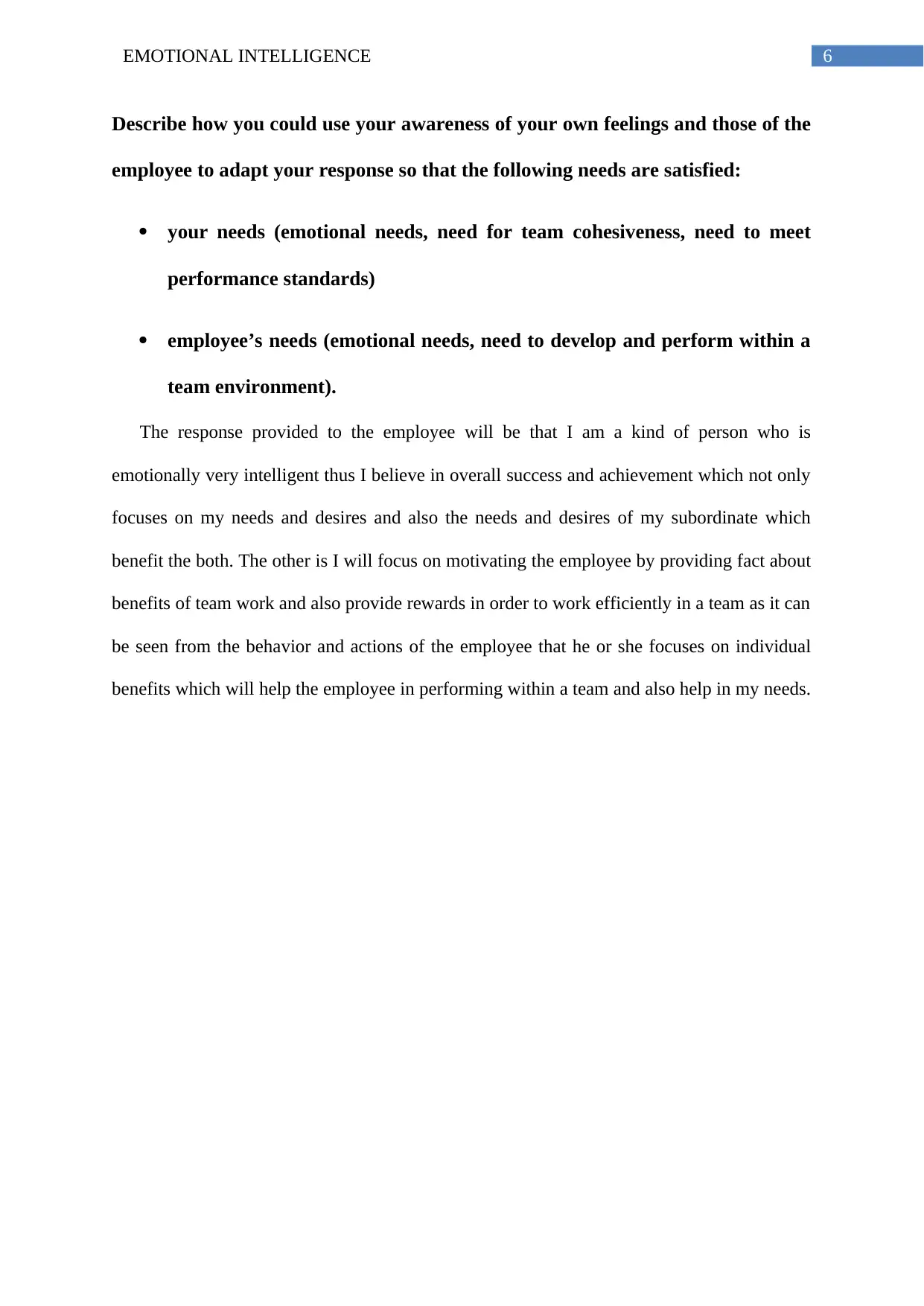
6EMOTIONAL INTELLIGENCE
Describe how you could use your awareness of your own feelings and those of the
employee to adapt your response so that the following needs are satisfied:
your needs (emotional needs, need for team cohesiveness, need to meet
performance standards)
employee’s needs (emotional needs, need to develop and perform within a
team environment).
The response provided to the employee will be that I am a kind of person who is
emotionally very intelligent thus I believe in overall success and achievement which not only
focuses on my needs and desires and also the needs and desires of my subordinate which
benefit the both. The other is I will focus on motivating the employee by providing fact about
benefits of team work and also provide rewards in order to work efficiently in a team as it can
be seen from the behavior and actions of the employee that he or she focuses on individual
benefits which will help the employee in performing within a team and also help in my needs.
Describe how you could use your awareness of your own feelings and those of the
employee to adapt your response so that the following needs are satisfied:
your needs (emotional needs, need for team cohesiveness, need to meet
performance standards)
employee’s needs (emotional needs, need to develop and perform within a
team environment).
The response provided to the employee will be that I am a kind of person who is
emotionally very intelligent thus I believe in overall success and achievement which not only
focuses on my needs and desires and also the needs and desires of my subordinate which
benefit the both. The other is I will focus on motivating the employee by providing fact about
benefits of team work and also provide rewards in order to work efficiently in a team as it can
be seen from the behavior and actions of the employee that he or she focuses on individual
benefits which will help the employee in performing within a team and also help in my needs.
Paraphrase This Document
Need a fresh take? Get an instant paraphrase of this document with our AI Paraphraser
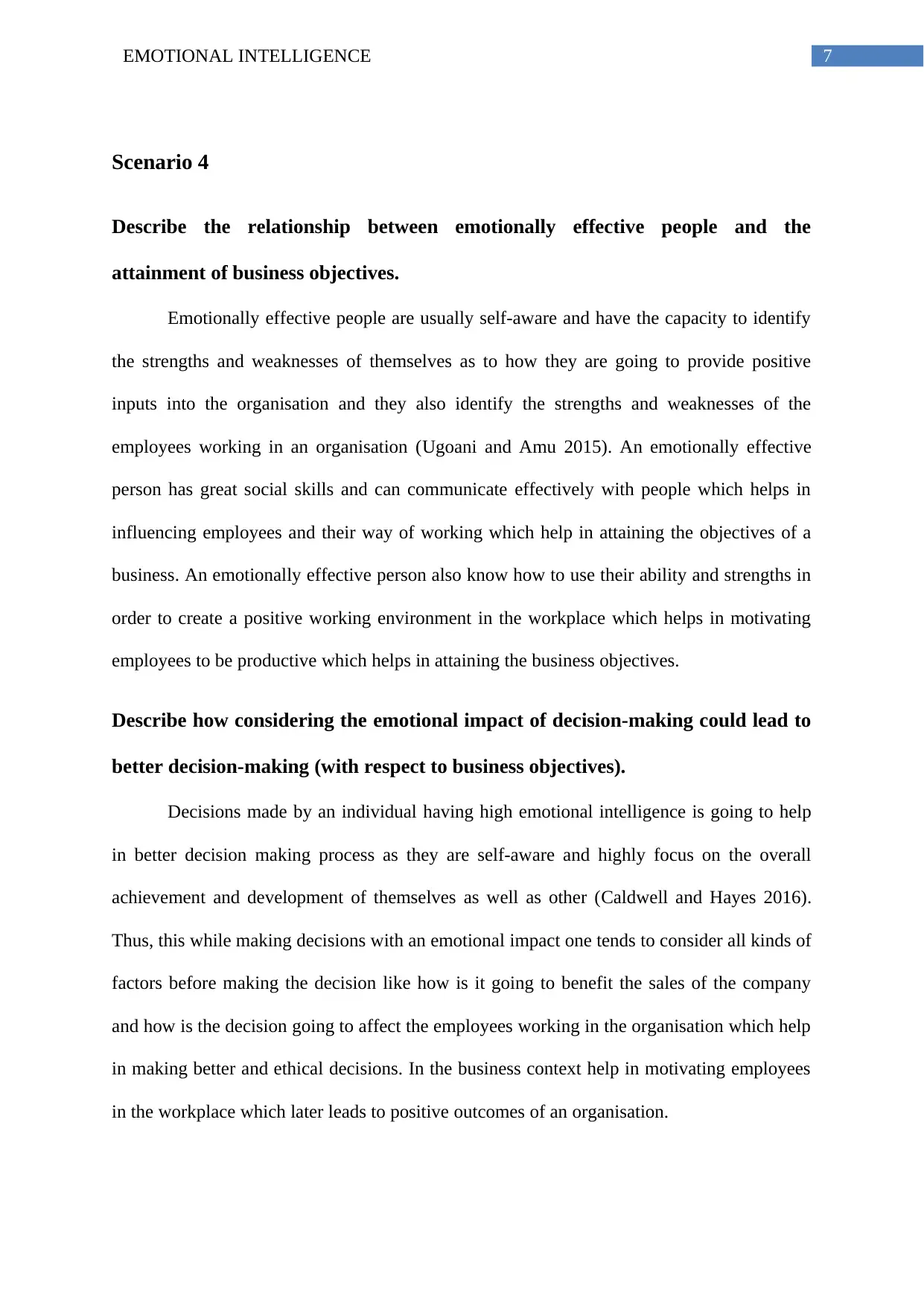
7EMOTIONAL INTELLIGENCE
Scenario 4
Describe the relationship between emotionally effective people and the
attainment of business objectives.
Emotionally effective people are usually self-aware and have the capacity to identify
the strengths and weaknesses of themselves as to how they are going to provide positive
inputs into the organisation and they also identify the strengths and weaknesses of the
employees working in an organisation (Ugoani and Amu 2015). An emotionally effective
person has great social skills and can communicate effectively with people which helps in
influencing employees and their way of working which help in attaining the objectives of a
business. An emotionally effective person also know how to use their ability and strengths in
order to create a positive working environment in the workplace which helps in motivating
employees to be productive which helps in attaining the business objectives.
Describe how considering the emotional impact of decision-making could lead to
better decision-making (with respect to business objectives).
Decisions made by an individual having high emotional intelligence is going to help
in better decision making process as they are self-aware and highly focus on the overall
achievement and development of themselves as well as other (Caldwell and Hayes 2016).
Thus, this while making decisions with an emotional impact one tends to consider all kinds of
factors before making the decision like how is it going to benefit the sales of the company
and how is the decision going to affect the employees working in the organisation which help
in making better and ethical decisions. In the business context help in motivating employees
in the workplace which later leads to positive outcomes of an organisation.
Scenario 4
Describe the relationship between emotionally effective people and the
attainment of business objectives.
Emotionally effective people are usually self-aware and have the capacity to identify
the strengths and weaknesses of themselves as to how they are going to provide positive
inputs into the organisation and they also identify the strengths and weaknesses of the
employees working in an organisation (Ugoani and Amu 2015). An emotionally effective
person has great social skills and can communicate effectively with people which helps in
influencing employees and their way of working which help in attaining the objectives of a
business. An emotionally effective person also know how to use their ability and strengths in
order to create a positive working environment in the workplace which helps in motivating
employees to be productive which helps in attaining the business objectives.
Describe how considering the emotional impact of decision-making could lead to
better decision-making (with respect to business objectives).
Decisions made by an individual having high emotional intelligence is going to help
in better decision making process as they are self-aware and highly focus on the overall
achievement and development of themselves as well as other (Caldwell and Hayes 2016).
Thus, this while making decisions with an emotional impact one tends to consider all kinds of
factors before making the decision like how is it going to benefit the sales of the company
and how is the decision going to affect the employees working in the organisation which help
in making better and ethical decisions. In the business context help in motivating employees
in the workplace which later leads to positive outcomes of an organisation.
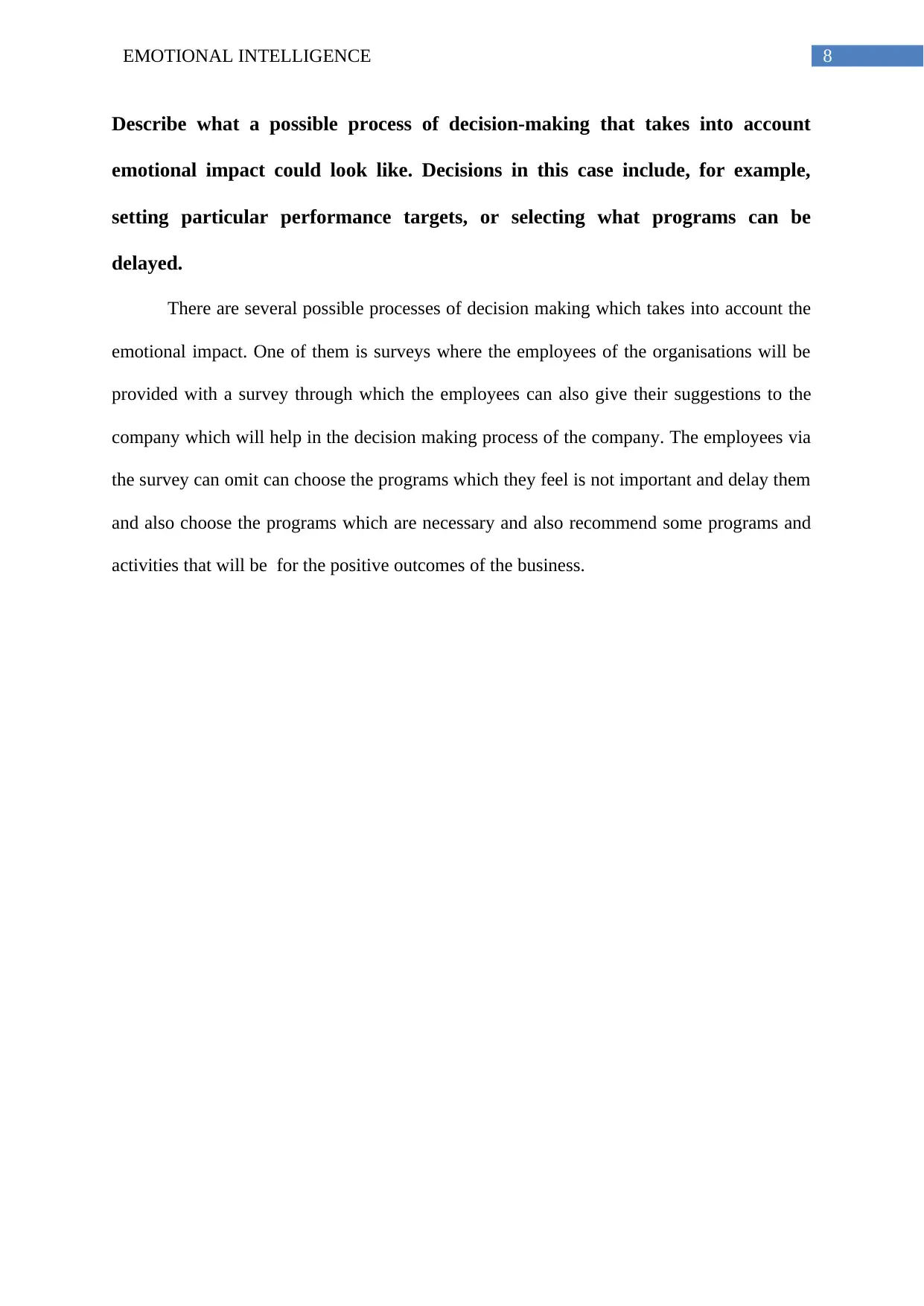
8EMOTIONAL INTELLIGENCE
Describe what a possible process of decision-making that takes into account
emotional impact could look like. Decisions in this case include, for example,
setting particular performance targets, or selecting what programs can be
delayed.
There are several possible processes of decision making which takes into account the
emotional impact. One of them is surveys where the employees of the organisations will be
provided with a survey through which the employees can also give their suggestions to the
company which will help in the decision making process of the company. The employees via
the survey can omit can choose the programs which they feel is not important and delay them
and also choose the programs which are necessary and also recommend some programs and
activities that will be for the positive outcomes of the business.
Describe what a possible process of decision-making that takes into account
emotional impact could look like. Decisions in this case include, for example,
setting particular performance targets, or selecting what programs can be
delayed.
There are several possible processes of decision making which takes into account the
emotional impact. One of them is surveys where the employees of the organisations will be
provided with a survey through which the employees can also give their suggestions to the
company which will help in the decision making process of the company. The employees via
the survey can omit can choose the programs which they feel is not important and delay them
and also choose the programs which are necessary and also recommend some programs and
activities that will be for the positive outcomes of the business.
⊘ This is a preview!⊘
Do you want full access?
Subscribe today to unlock all pages.

Trusted by 1+ million students worldwide
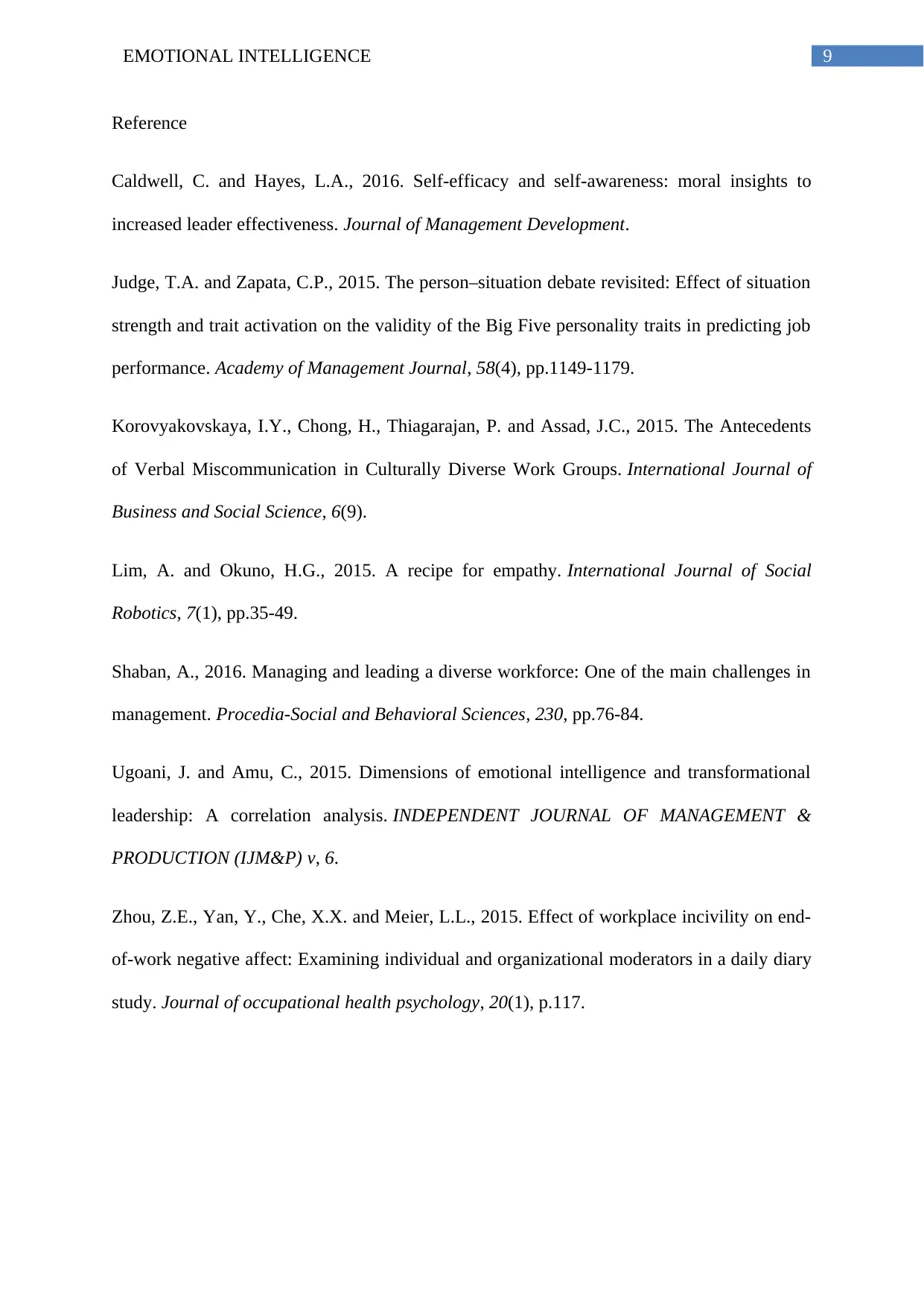
9EMOTIONAL INTELLIGENCE
Reference
Caldwell, C. and Hayes, L.A., 2016. Self-efficacy and self-awareness: moral insights to
increased leader effectiveness. Journal of Management Development.
Judge, T.A. and Zapata, C.P., 2015. The person–situation debate revisited: Effect of situation
strength and trait activation on the validity of the Big Five personality traits in predicting job
performance. Academy of Management Journal, 58(4), pp.1149-1179.
Korovyakovskaya, I.Y., Chong, H., Thiagarajan, P. and Assad, J.C., 2015. The Antecedents
of Verbal Miscommunication in Culturally Diverse Work Groups. International Journal of
Business and Social Science, 6(9).
Lim, A. and Okuno, H.G., 2015. A recipe for empathy. International Journal of Social
Robotics, 7(1), pp.35-49.
Shaban, A., 2016. Managing and leading a diverse workforce: One of the main challenges in
management. Procedia-Social and Behavioral Sciences, 230, pp.76-84.
Ugoani, J. and Amu, C., 2015. Dimensions of emotional intelligence and transformational
leadership: A correlation analysis. INDEPENDENT JOURNAL OF MANAGEMENT &
PRODUCTION (IJM&P) v, 6.
Zhou, Z.E., Yan, Y., Che, X.X. and Meier, L.L., 2015. Effect of workplace incivility on end-
of-work negative affect: Examining individual and organizational moderators in a daily diary
study. Journal of occupational health psychology, 20(1), p.117.
Reference
Caldwell, C. and Hayes, L.A., 2016. Self-efficacy and self-awareness: moral insights to
increased leader effectiveness. Journal of Management Development.
Judge, T.A. and Zapata, C.P., 2015. The person–situation debate revisited: Effect of situation
strength and trait activation on the validity of the Big Five personality traits in predicting job
performance. Academy of Management Journal, 58(4), pp.1149-1179.
Korovyakovskaya, I.Y., Chong, H., Thiagarajan, P. and Assad, J.C., 2015. The Antecedents
of Verbal Miscommunication in Culturally Diverse Work Groups. International Journal of
Business and Social Science, 6(9).
Lim, A. and Okuno, H.G., 2015. A recipe for empathy. International Journal of Social
Robotics, 7(1), pp.35-49.
Shaban, A., 2016. Managing and leading a diverse workforce: One of the main challenges in
management. Procedia-Social and Behavioral Sciences, 230, pp.76-84.
Ugoani, J. and Amu, C., 2015. Dimensions of emotional intelligence and transformational
leadership: A correlation analysis. INDEPENDENT JOURNAL OF MANAGEMENT &
PRODUCTION (IJM&P) v, 6.
Zhou, Z.E., Yan, Y., Che, X.X. and Meier, L.L., 2015. Effect of workplace incivility on end-
of-work negative affect: Examining individual and organizational moderators in a daily diary
study. Journal of occupational health psychology, 20(1), p.117.
1 out of 10
Related Documents
Your All-in-One AI-Powered Toolkit for Academic Success.
+13062052269
info@desklib.com
Available 24*7 on WhatsApp / Email
![[object Object]](/_next/static/media/star-bottom.7253800d.svg)
Unlock your academic potential
Copyright © 2020–2026 A2Z Services. All Rights Reserved. Developed and managed by ZUCOL.





